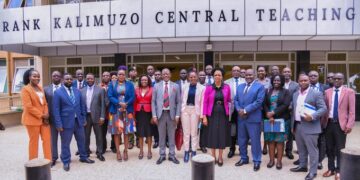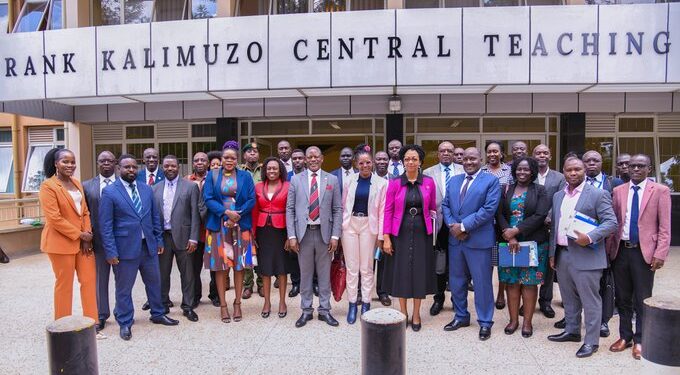By Dennis Katungi
For the last four financial years, Makerere University has had access to Government funding aimed at supporting high-impact research and innovations. This illustrates the increasing importance that the Government attaches to research, innovation and development as a catalyst to social-economic transformation.
The objective of the Makerere Research & Innovation Fund [Mak-RIF] is to increase the local generation of translatable research and scalable innovations that address key gaps required to drive Uganda’s social-economic transformation agenda. On 29 August 2023, the University convened a stakeholder engagement at the Kalimuzo Central Teaching Facility which I attended.
The Research and Innovation Fund managers led by the Vice Chancellor, Prof Barnabas Nawangwe and the Chairperson of the Fund Prof Fred Masagazi were the hosts of the group from Government Ministries, Departments and Agencies. They gave an update on the work done and the projects accomplished as well as those in progress. The University team also sought guidance on further identification of viable ventures for Mak-RIF to support from the private and public sectors. The engagement took place in the University Council room. Representatives from various Ministries, Departments and Agencies including the Office of the President, OPM, Defence/UPDF, Ministry of Finance, Local Government & others interacted and debated how to enrich the initiative.
In order to highlight their research and innovation agenda, the Makerere Research & Innovation Grants Management Committee (GMC) made a powerful PowerPoint presentation highlighting the projects covered thus far. They also plotted progress and challenges faced by the Fund.
The meeting also discussed the strategic relevance and interface of the work done at Makerere with the National Development Plan III. We discussed generating and sharing knowledge across the stakeholder spectrum to create a wider platform to focus on emerging needs and close the gaps from different sectors across the spectrum.
The Research and Innovation Fund has a specific agenda composed of 14 themes that cover key national development priorities in Agriculture, sustainable health, re-imagining Education, Water, sanitation and the environment, harnessing the social sector & tourism, manufacturing, science and technology, strengthening law, governance and human rights, defence and security, ICT, public service and local government administration as well as Energy and Minerals.

Among the projects highlighted was one from the School of Veterinary Medicine, Animal Resources and Bio-Security [CoVAB]. The process of developing an anti-tick vaccine is in advanced stages. The study has already determined the appropriate dose [Ra92a], the tick vaccine that elicits the highest antibodies. The research team has already engaged a commercial producer for animal drugs in Uganda, [Alfasan U Ltd] to manufacture the vaccine candidate under Good Manufacturing Practices [GMP] and has developed a field site at Ngoma Government farm for clinical trials. The president committed to fund this project to conclusion.
Then there is the Yo-Waste, a mobile and cloud-based haulier and garbage collection service. The researchers are working to improve municipal solid waste collection in Kampala and nearby urban communities using technology. 200 households use the app to schedule and request waste pick up. Over 120 tons of garbage that would have ended up in streets or water channels is being collected using this platform. 10 tons of plastic is collected and diverted from landfills to recyclers and manufacturers who add value. These are just two examples of many solutions that have come from the Research and Innovations Fund at Makerere.
There’s excellent work in progress in the areas of promoting youth employment by integrating employability skills in Teacher and BTVET Education, tackling Drug and Substance Abuse [DASA] in Primary and Secondary Schools, Developing and Testing digital Games for teenage Reproductive and Mental Health Education, Design and development of mobile irrigation technology systems for small to medium farmers and pastoralists in rain constrained areas of Uganda.
However, the Fund [Mak-RIF] faces challenges endemic across government. While the fund was seeking extra Government funding for the exciting high-impact innovation fund, the opposite happened. Approximately 5 billion shillings was slashed off the fund in the recent cross-cutting budget cuts in government. Makerere was ranked 8th best University in Africa and the highest-ranked University in sub-Saharan Africa outside of South Africa. Previously, the Times Higher Education World University Rankings had put MUK as the fourth best in Africa.
Makerere is the alma mater of many post-independence leaders, including several presidents of Tanzania, Kenya and Uganda. Other luminary alma mater includes famous academicians like Ngugi wa Thiongo, Ali Mazrui, Nuruddin Farah, John Ruganda and the late Nobel Prize laureate V.S. Naipaul. The University motto is appropriate: ‘We build for the future’.
The Writer is the Head of Communications and Media Relations at Uganda Media Centre. @Dennis_Katungi









